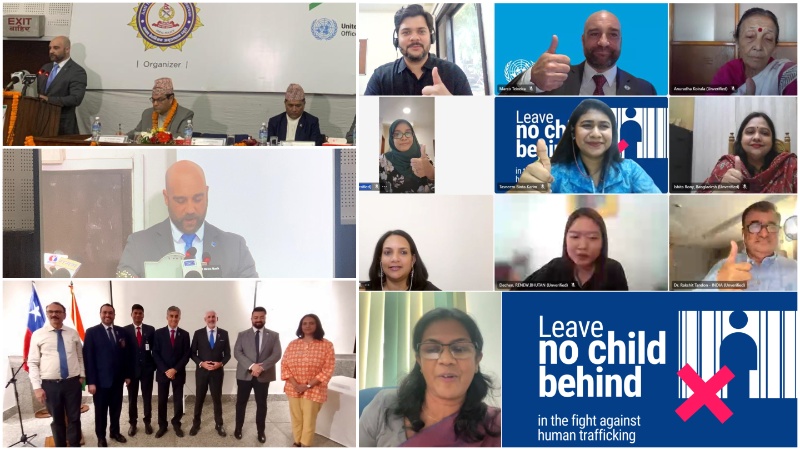South Asia: Stakeholders call for stronger mechanisms to counter trafficking in persons

New Delhi, India/31 July 2024: Trafficking in persons remains one of the most grave violations of human rights, with devastating consequences for millions of victims around the world. In South Asia, the fight against this inhumane crime is gaining momentum through robust regional collaboration and awareness-raising initiatives. This is key, as the South Asian nations proximity and interconnected socio-economic conditions contribute to a troubling trend where most trafficking cases involve victims trafficked within the region itself.
Marking the World Day against Trafficking in Persons with a compelling regional dialogue, UNODC brought together leading experts from Bangladesh, Bhutan, India, Maldives, Nepal, and Sri Lanka. The discussion, moderated by Ms. Tasneem Binta from UNODC, served as a platform for these experts to share their national responses and discuss collaborative strategies to combat human trafficking, with a particular focus on protecting children.
Ms. Ishita Rony, Deputy Secretary, Public Security Division, Ministry of Home Affairs, Bangladesh, Ms. Dechen Choki, Senior Legal Officer, Renew Bhutan, Dr. Rakshit Tandon, Cyber Security Expert from India, Ms. Azha Ibrahim, Assistant Director, Anti Trafficking in Persons Office, Ministry of Homeland Security and Technology, Maldives, Ms. Anuradha Koirala, Founder, Maiti Nepal and Ms. Preethika Sakalasooriya, Director (Legal), National Child Protection Authority, Sri Lanka and Mr. Marco Teixeira, UNODC Regional Representative for South Asia joined the dialogue.
Discussions emphasised emerging threats, cyber risks, vulnerabilities of children as well as good practices. Experts called for 'unified action' to end human trafficking by enhancing child protection systems, promoting prevention efforts and strengthening law enforcement responses.
In Kathmandu, Nepal, over 500 officials, educators, civil society members, and young people gathered to reaffirm their commitment to ending human trafficking. At a special event hosted by UNODC in collaboration with the Anti-Human Trafficking Bureau of Nepal Police, AHTB Bureau, Anahata Nepal, and Society for Integrated Allied, the event highlighted the urgent need for collective action against this global crisis.
Dr. Ramesh Lekhak, Minister of Home Affairs of Nepal chaired the program, with the presence of Inspector General of Nepal Police, and UNODC Regional Representative for South Asia. Together, they underscored the necessity for enhanced collective efforts to protect vulnerable children and ensure that no one is left behind in the fight against human trafficking. The program featured a debate, a poetry competition, and survivors' storytelling, which vividly illustrated the personal impacts of trafficking. Students engaged in face painting with themes related to trafficking, making the issue more accessible and relatable.

The thematic focus for this year’s World Day, “Leave No Child Behind in the Fight Against Human Trafficking,” was evident throughout the program. This theme emphasizes the disproportionate impact of trafficking on children, particularly girls, and aims to accelerate global and regional actions to safeguard their rights. The narrative was powerfully conveyed through the day's activities, ensuring that the urgency and gravity of the issue resonated with all attendees.
In addition to the webinar, a National Dialogue in Dhaka, Bangladesh, furthered these discussions. Organized by the Public Security Division and supported by UNODC's GLO.ACT-Bangladesh project, this event aimed to bolster national efforts and coordinate regional strategies against trafficking. UNODC’s Deepika Naruka, Programme Coordinator on TOC and illicit trafficking joined an expert panel and delivered a presentation on latest human trafficking trends at a briefing organized by the Embassy of Chile in New Delhi, India.
The activity contributed to SDG 5, SDG 16 and SDG 17: https://sdg-tracker.org/